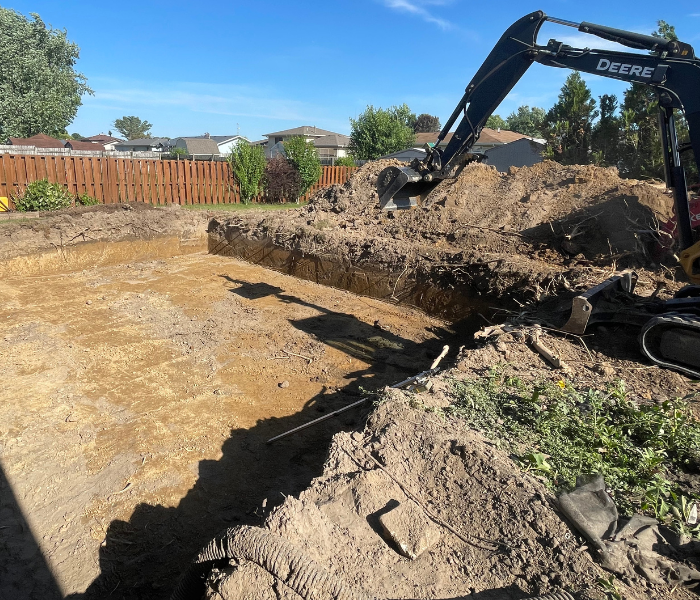Lancaster Trenching - Professional Trenching Solutions in Lancaster, Ohio
Lancaster Trenching - Professional Trenching Solutions in Lancaster, Ohio
Blog Article
Comprehensive Excavation Approaches: Mastering the Fundamentals for Success
The cautious planning, specific implementation, and careful focus to detail called for in excavation jobs require a comprehensive approach that includes various fundamental facets. The true proficiency exists not simply in recognizing these basics but in seamlessly integrating them to navigate the intricacies of excavation tasks with skill.
Recognizing Excavation Task Planning

The preliminary phase of any kind of excavation task is the planning phase, where essential choices are made that can significantly impact the result of the job. Recognizing the project timeline, budget plan, and scope restraints is vital for developing a detailed excavation plan that makes sure the task's success.
One trick element of excavation project preparation is the advancement of a thorough timeline that outlines the sequence of milestones, tasks, and due dates. This timeline acts as a roadmap for the project team, enabling them to track development and make required changes to ensure the task remains on schedule. In addition, a well-defined spending plan that makes up all costs, including devices leasing, labor costs, and products, is necessary for avoiding cost overruns and hold-ups. By very carefully thinking about all these variables during the preparation stage, excavation jobs can be executed effectively and successfully, leading to successful results.
Soil Evaluation and Website Evaluation
Carrying out detailed soil evaluation and site assessment is a critical action in the prep work phase of any type of excavation job. Dirt evaluation includes identifying the make-up, framework, and homes of the soil at the excavation site. This details is important for comprehending the soil's bearing capability, wetness web content, and possibility for disintegration, which are crucial variables in identifying the excavation approaches and devices required for the project.
Site analysis exceeds dirt analysis and includes a wider assessment of the general site conditions. This assessment includes identifying any type of potential threats, such as underground energies, environmental issues, or unsteady terrain, that might affect the excavation process. By extensively reviewing the site, task managers can develop efficient excavation methods that prioritize safety, effectiveness, and environmental management.
Using sophisticated technologies like ground-penetrating radar, dirt sampling, and drone studies can enhance the precision and effectiveness of dirt analysis and site assessment. Investing time and resources in these preliminary actions can inevitably save time and protect against costly delays or issues during the excavation process.
Tools Selection and Utilization
Efficient excavation tasks rely heavily on tactical tools choice and utilization to make certain optimal performance and efficiency. Choosing the ideal devices for the work is essential in making the most of performance and reducing downtime. Variables such as the kind of dirt, deepness of excavation, and project range play a considerable function in determining one of the most appropriate tools for the task handy.

In enhancement to selecting the appropriate devices, proper usage is key to task success. Operators should be trained to take care of the equipment safely and effectively - lancaster excavation. Routine maintenance checks and prompt repair services aid prevent break downs and guarantee constant performance throughout the task
Precaution and Regulations Conformity
In the realm of excavation tasks, prioritizing security steps and conformity with laws is critical to guaranteeing a secure and legitimately audio operational setting. Precaution incorporate an array of techniques, consisting of carrying out thorough website evaluations, executing proper signs and obstacles, and offering adequate safety and security training for all personnel included in the excavation procedure. Adherence to guidelines, such as OSHA needs in the United States, makes certain that the excavation task meets the essential standards to protect employees, bystanders, and the surrounding setting.

Monitoring Development and Adjusting Techniques
How can forecast managers efficiently track the advancement of excavation projects and adjust their strategies appropriately to optimize outcomes? Monitoring development is essential for making sure that excavation tasks stay on track and satisfy target dates. Task managers can utilize various devices and strategies to track progression, such as everyday progress reports, routine website examinations, and advanced monitoring technologies like drones and general practitioners tracking systems. By continually checking the task's innovation, supervisors can identify any type of prospective delays or problems beforehand and take positive steps to address them.

Verdict
Finally, understanding the basics of detailed excavation approaches is important for the success of any task. By comprehending job preparation, examining soil and website conditions, selecting suitable devices, abiding by safety regulations, and monitoring development, project supervisors can guarantee a smooth and effective excavation procedure. Executing these strategies will result in effective outcomes and minimize possible threats or troubles during the excavation job.
The first phase of any excavation task is the planning stage, where critical decisions are made that can substantially affect the end result of the job. Recognizing the project scope, spending plan, and timeline restrictions is crucial for developing a thorough excavation strategy that ensures the project's success.
Just how can predict supervisors properly track the innovation of excavation jobs and adjust their methods accordingly to optimize results? By closely keeping an eye on development and being prepared to adapt strategies, job managers can enhance the overall success of excavation projects.
By understanding project planning, assessing dirt and website problems, choosing suitable equipment, conforming with security guidelines, and keeping an eye on development, job managers can ensure a smooth and efficient excavation process.
Report this page